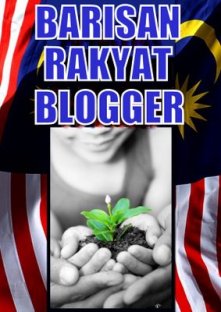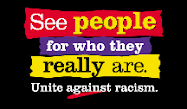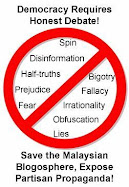This is a joint statement made by more than fifty civil society organizations, where they spelt out a framework for a new national discourse which embodies diversity and dissent and the rejection of political violence as the true signs of nationhood.
New Nationalism: Freedom with Empowering Peace
We the undersigned civil society organizations believe that Malaysia must renew our national independence after Malaya, Sabah and Sarawak were brought together to become a new nation 46 years ago.
Following a series of saddening and outraging developments since the last Malaysia Day, we feel strongly the need for a new discourse of nationalism that denounces political violence and pursues empowering peace.
Diversity and dissent are signs of real independence.
We fully appreciate the complexity of Malaysia in ethnic, religious, linguistic, cultural, regional, socio-economical, gender, lifestyle and physical terms. We therefore do not pretend that there is a single Malaysia that would meet the expectation and aspiration of every Malaysian. We are proud with our own vision for the nation and at the same time respect those of others.
We see the differences in preferences and opinion of how this country should move forward as both inevitable and desirable - inevitable because we are free to choose; and desirable because we have plenty alternatives to consider. Diversity and dissent in public opinion are beautiful signs of real independence.
We believe, however, every Malaysian, politician and voter alike, must sign up to one common position: the elimination of political violence.
Political violence threatens our independence
Political violence refers to actions that aim to achieve certain political goals by causing harm to others or subduing them with violence. This must not be confused with legitimate exercise of freedom of speech, assembly and association where violence is not preached, threatened and executed.
More than violation of peace, political violence is exploitation of the physically weak and outnumbered. It deprives the victims of political violence their right to participate in public affairs and prevents the emergence of an inclusive outcome through the use of reason.
In fact, political violence is at the core of colonialism as it was the very means how colonial rule was imposed on us. National liberation is in this sense meaningful only when all citizens are free from further colonization of violence and may exercise freedom and reason in running their public life.
Four principles of Empowering Peace
In this regard, peace associated with fear that inhibits us from full participation in public affairs is but pseudo peace.
True peace must be empowering and inclusive to allow all Malaysians to contribute to and enjoy the national life. True peace requires rule of law and protection of human rights. It is therefore political, but in no way partisan.
We call upon every Malaysian citizen and organization, especially the politicians and political parties, to sign up to the following principles:
1. Zero tolerance for violence as a political means
Civilized life requires restrain and self-control. Conflicts should be solved through dialogues, deliberation, debates or litigation. There must be zero tolerance for the use, threat or incitement of violence as a political means, regardless of circumstances or subject matters.
In this sense, the perpetrators of the cow-head protest should be charged for incitement of violence, not sedition or illegal assembly. The thugs who threatened to rape Rodziah Ismail and to murder Khalid Samad, the elected representatives in Shah Alam, must be investigated and prosecuted for criminal intimidation. The threat of sexual violence, a common trait in many communal conflicts, is especially alarming and absolutely intolerable.
2. Fighting Hatred with Reason
Hatred exists in every society and can only be effectively eliminated by reason, not law. Given a vibrant public sphere, the flaws of hate speeches can be exposed and the perpetrators shamed. Legal suppression only weakens the society’s resistance to hatred by removing the need for intellectual rigour and moral courage to confront bigotry.
The latest harassment of Malaysiakini by the Malaysian Communication and Multimedia Commission (MCMC) for featuring video-clips of the cow-head protest and the Home Minister’s press conference justifying the act is not only violating freedom of expression, but also protecting violence from public shaming.
3. The State’s Duty to Protect Political Participation
The state which monopolizes the legitimate use of violence should exist only to protect citizens from private violence, not to inflict more violence than necessary. The state’s coercive power therefore must never be used against peaceful political activities. Instead, the state has the duty to protect political participation.
Instead of arbitrarily arresting over 160 1BLACKMalaysia protesters, lawyers on duty, 589 Anti-ISA protestors and bystanders, the anti-PPSMI, Kampung Buah Pala and Hindraf protesters, and using unnecessary violence, the police should have only controlled traffic and maintained order. After all, the validity of the protesters’ causes should be judged by the citizen, not the police or the Executive.
4. Upholding Elected Government
The threat of political violence is greatest when political elites resort to means other than elections to attain power. Democracy is the only guarantee for political stability and peace. Politicians and political parties must therefore do their best to win elections honestly, not usurping power after elections. Otherwise, democratic breakdown may lead to coups or revolutions.
The Perak coup has seen an elected government being overthrown by a host of unelected institutions including but not limited to the Malaysian Anti-Corruption Commission (MACC), the Election Commission (EC), the Judiciary, the bureaucracy and the police. The partisan investigation of MACC in Selangor amidst the Barisan Nasional’s express wish to takeover the state had led to the death of Teoh Beng Hock, the first of a state official in the custody of a federal agency. If there is no firmed commitment from both sides of the political divide to democracy, the next election may see the military being the next unelected institution dragged into political struggle.
On the auspicious birthday of Malaysia, which should have been made a national holiday 46 years ago, let us all vow to make empowering peace the basis of public life of our nation so that all of us may enjoy real freedom.
The signatories:
1. 1BLACKMalaysia Facebook Page and Group
2. Aliran Kesedaran Negara (Aliran)
3. All Women’s Action Society Malaysia (AWAM)
4. Amnesty International Malaysia
5. Centre for Independent Journalism (CIJ)
6. Centre for Policy Initiatives (CPI)
7. Centre for Public Policy Studies (CPPS)
8. Civil Rights Committee, Kuala Lumpur and Selangor Chinese Assembly Hall (CRC-KLSCAH)
9. Civil Society Committee, LLG Cultural Development Centre (LLG-CSC)
10. Civil Society Initiative for Parliamentary Reform (CSI@Parliament)
11. Council of Churches of Malaysia Youth Network
12. Durham Malaysian Scholars
13. Gabungan Bertindak Mahasiswa Utara(GBMU)
14. Group of Concerned Citizens (GCC)
15. Institut Kajian Dasar (IKD)
16. Institute for Development of Alternative Living (IDEAL), Sibu
17. Islamic Renaissance Front (IRF)
18. Jaringan Orang Asal Semalaysia (JOAS)
19. Jawatankuasa Penduduk Zon 23 MPSJ
20. Justice for Beng Hock Facebook Page and Group
21. Kuala Lumpur and Selangor Chinese Assembly Hall Youth Section (KLSCAH-YS)
22. Kumpulan Aktivis Mahasiswa Independen (KAMI)
23. Malaysia Youth and Student Democratic Movement (DEMA)
24. Malaysian AIDS Council
25. Malaysian Indian Development Association
26. Middle Eastern Graduate Centre (Magc)
27. Monitoring Sustainability of Globalisation (MSN)
28. Muslim Professionals Forum (MPF)
29. National Institute for Electoral Integrity (NIEI)
30. Oriental Hearts and Mind Study Institute (OHMSI)
31. Pahlawan Volunteers
32. Partners of Community Organisations, Sabah (PACOS)
33. Penang Du Zhong Education Society
34. Penggerak Belia Zon 23 MPSJ
35. Persatuan Alumni PBTUSM Selangor
36. Persatuan Kesedaran Komuniti Selangor (Empower)
37. Persatuan Meditasi Projan KL & Selangor
38. Persatuan Penduduk Taman Muhibbah Seri Kembangan
39. Research for Social Advancement (REFSA)
40. Sarawak Central Region Friendship Association
41. Semparuthi Iyakkam
42. Sisters in Islam (SIS)
43. Suara Rakyat Malaysia (Suaram)
44. Tenaganita
45. The Micah Mandate (TMM)
46. The People’s Parliament
47. TONIBUNG (Friends for Village Development), Sabah
48. Women's Aid Organisation (WAO)
49. Women's Candidacy Initiative (WCI)
50. Writer Alliance for Media Independence (WAMI)






















No comments:
Post a Comment
How to Paste Text into Comment Boxes
Google seems to have disabled pasting text (including ctrl-v) into blogger comments boxes in Firefox. The good news is that:
1. You can still copy paste using Internet Explorer (I successfully tried it with IE7)
2. With Firefox, you can still "Drag and Drop" text into the comment form. I have successfully dragged and dropped text from MS Word, websites (HTML) and from ScribeFire (plain text and HTML). Just do the following:
a) reduce the size of the window you want to take the text from, and place it near the comment box
b) Highlight the required text with cursor
c) Click on the highlighted text and drag it over to the comment box and drop it there.
Happy commenting!